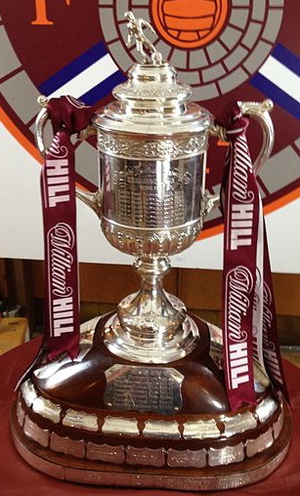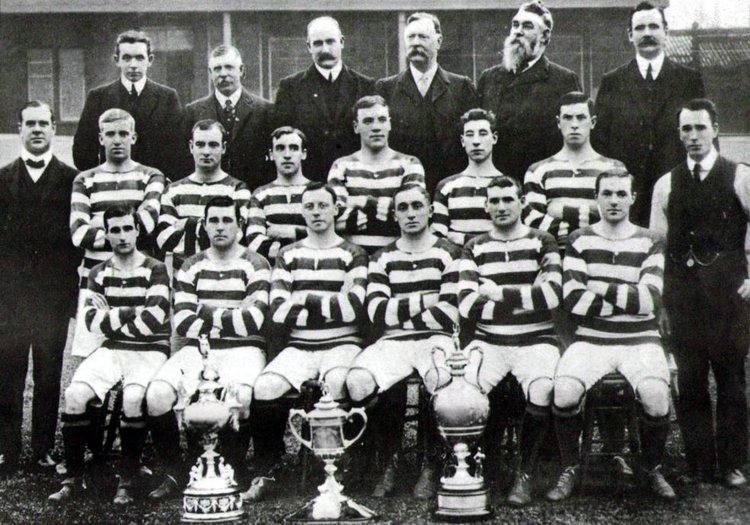Scottish Cup Stadiums & Stats

The Scottish Cup is the North of the border’s equivalent to England’s FA Cup.
It is organised by the Scottish FA and its full, official title is The Scottish Football Association Challenge Cup.
It is actually the second oldest competition in association football history, having first taken place in the 1873-74 season – only the FA Cup is older.
At the time of writing it is known as The William Hill Scottish Cup because of sponsorship, though we won’t be referring to it as that as it sounds a bit rubbish.
What we will do, though, is tell you all about the cup and what is involved in the process of winning it, from qualification right the way through to the final.
We’ll give you some information about its history and we’ll tell you a little bit about the grounds that have been used to host it in the past.
Ready? Och aye.
Scottish Cup Stadiums
| Stadium | Year Opened | Capacity | Ave Attendance | Record Attendance | Record Attendance Match |
|---|---|---|---|---|---|
|
Hampden Park
Scotland / Queen's Park |
1903 | 51866 | 50597 | 149547 | Scotland v England (1937) |
Tournament Format
Qualification
The Scottish Cup is open to any full or associate member of the Scottish Football Association. That means that all clubs that are in the Scottish Professional Football League, or SPFL are eligible to play in the Cup. If a club isn’t in the SFA they can still qualify to play in the tournament if they have won any of the Highland League, the Lowland League or the East or South of Scotland Football Leagues. Members of the Scottish Junior Football Association, or SJFA, can also qualify if they’ve won one of the three Super League regional divisions or the Scottish Junior Cup. Winners of the Scottish Amateur Club are also able to take part in the competition.
Because such a large amount of clubs are eligible to play in the Scottish Cup, it begins at the start of the Scottish football season and the final is normally the last game of the Scottish football calendar. There is also a staggered entry system for the competition, with teams entering it at different times depending on their level and league ranking. As with the FA Cup in England there is a pre-tournament stage that sees the smaller clubs go head-to-head for the right to play in the competition proper. the entire process from qualification through to the final is played as a knockout competition.
In the 2015-2016 tournament, for example, five clubs were given a bye to the second preliminary round and ten clubs played against each other to see who would join them. These ten clubs were comprised of one team from the Scottish Highland Football League, nine clubs from the ESL, the SSL and other leagues from around Scotland, three clubs from the SJFA and the Scottish Amateur Cup winners. They played each other in knockout games with five teams advancing to the second preliminary round. Those ten teams then played against each other with the five winning teams advancing to the first round of the competition proper.
Rounds One To Four
| Round | New Teams Entering | Teams from Previous Round | Teams Total | No Fixtures |
|---|---|---|---|---|
| Preliminary One | 10 | – | 10 | 5 |
| Preliminary Two | 7 | 5 | 12 | 6 |
| One | 30 | 6 | 36 | 18 |
| Two | 14 | 18 | 32 | 16 |
| Three | 16 | 16 | 32 | 16 |
| Four | 16 | 16 | 32 | 16 |
| Last 16 | – | 16 | 16 | 8 |
| Quarter Finals | – | 8 | 8 | 4 |
| Semi-Finals | – | 4 | 4 | 2 |
| Final | – | 2 | 2 | 1 |
In Round One the five winning teams from the preliminary rounds are joined by fifteen clubs from the Scottish Highland Football League. Twelve teams from the Scottish Lowland Football League also join the competition, as do four clubs from the ESL and other leagues. Those 36 clubs play each other in knockout games drawn at random, with the eighteen winning teams advancing to Round Two.
The eighteen winners from Round One are joined by the winners and runners-up of both the Scottish Highland Football League and the Scottish Lowland Football League, as well as by ten clubs from League Two of the Scottish Professional Football League. Those 32 teams play each other and sixteen teams go through to Round Three.
Round Three is where the ten teams from League One of the SPFL join the sixteen winners from Round Two as well as six teams from the SPFL Championship to make up another round of 32 teams. Once more sixteen of those teams advance to the fourth round, the final one in which clubs who have yet to play in the tournament can join in.
Round Four is where things get interesting as this is when the big boys join the tournament. The sixteen winners from Round Three all go into the pot and are joined by the remaining teams from the SPFL Championship and the teams that comprise the SPFL Premiership. That allows for another round of sixteen games made up of 32 teams, with the winners progressing to Round Five.
Round Five To The Final

Round Five, or the last sixteen as it’s sometimes called, is usually played in February in Scotland. It sees the remaining sixteen teams go head-to-head over eight games for a place in the next stage of the competition. The winners progress to Round Six, more commonly known as the quarter-finals. Those four games featuring the remaining eight teams are played, as with the previous rounds, at the home of the first team whose name was drawn at random from the pot. The winners make it through to Round Seven.
As with virtually all competitions, this stage of the process is no longer known by its round number but is instead labelled as the semi-finals. The Four remaining teams play against each other at a neutral venue in order to discover who will have the right to contest the Scottish Cup final. In all prior rounds if the game ends in a draw after 90 minutes then it is replayed at the away teams ground. The semi-finals and final must be decided on the day, however, with the extra-time and penalties coming into play if necessary. The final of the Scottish Cup is also played at a neutral venue, but we’ll tell you a bit more about that later.
Previous Winners
The table below shows all teams that have won the Scottish Cup on two or more occasions
| Team | Scottish Cups | No Runners Up | Last Won |
|---|---|---|---|
| Celtic | 38 | 18 | 2018 |
| Rangers | 33 | 18 | 2009 |
| Queen's Park | 10 | 2 | 1893 |
| Hearts | 8 | 6 | 2012 |
| Aberdeen | 7 | 8 | 1990 |
| Hibernain | 3 | 11 | 2016 |
| Kilmarnock | 3 | 5 | 1997 |
| Vale of Leven | 3 | 4 | 1879 |
| St Mirren | 3 | 3 | 1987 |
| Clyde | 3 | 3 | 1958 |
| Dundee United | 2 | 8 | 2010 |
| Motherwell | 2 | 5 | 1991 |
| Third Lanark | 2 | 4 | 1905 |
| Falkirk | 2 | 3 | 1957 |
| Dunfermline | 2 | 3 | 1968 |
| Renton | 2 | 3 | 1988 |
Scottish Cup Stats
| Tournament Stats | |
|---|---|
| First Year | 1873 |
| Number Of Teams Competing | 92 |
| Record Titles | Celtic (39) |
| Prize Money Winner | £60,000 |
| Runners-Up | £30,000 |
| Round One Money | £2,000 |
| Club Stats | |
|---|---|
| Runners-up | Celtic (18), Rangers (18) |
| Total Final Appearances | Celtic (57) |
| Teams To Appear In Final | 34 |
| Number Of Winners | 25 |
| Final Appearances Without Winning | Hamilton Academical (2) |
| Scottish League & Cup Double Winners | Rangers (18), Celtic (18), Aberdeen (1) |
| Scottish League, Cup & League Cup Treble Winners | Rangers (7), Celtic (6) |
| Biggest Win | Arbroath 36 - Bon Accord 0 (1884) |
| Player Stats | |
|---|---|
| Highest Scorer | Jimmy McGrory (77) |
| Most Cup Final Wins | Bobby Lennox (8) |
| Youngest Player To Play In Final | John Fleck (16 years 274 days) |
About the Scottish Cup
In The Beginning

The trophy awarded to the winners of the Scottish Cup is the oldest association football trophy in the world. Though the Youdan Cup was played earlier than the 1873 date that saw the kick off of the Scottish Cup, it was played to the then popular Sheffield Rules rather than those established by the Football Association that became the game we know and love today, meaning it was not an Association game. The FA Cup is older than it as a competition, but the trophy presented to the victors was made in 1911.
The Scottish Football Association was formed on the 13th of March 1873 when eight Scottish football clubs got together and decided to form their own version of the same thing that was happening in England. They immediately set about raising money in order to instigate a Challenge Cup, with £56 12s and 11d raised for the purpose. Queen’s Park won the first final, played in 1874, by beating Clydesdale 2-0.
The Spiders went on to win the next two finals and to dominate the competition for the next fifteen years, alongside Vale of Leven, Renton and Dumbarton. The early 1890s saw the game of football slowly making the move towards professionalism, meaning that the bigger cities started to take the sport more seriously. The first ever ‘Old Firm’ Scottish Cup final between Celtic and Rangers took place in 1894 when the latter beat the former by 3 goals to 1, whilst other big clubs like Hibernian and Hearts also got their name on the trophy towards the end of the century.
After The Wars
There were no Scottish Cup games played between 1915 and 1919 because of the outbreak of the First World War, meaning the final game before the break was Celtic’s 4-1 win over Hibs in April of 1914. It was, perhaps, a sign of things to come as Celtic have since won the record number of Scottish Cup finals.
The competition resumed for the 1919-1920 season and Kilmarnock won a tight game against Albion Rovers by 3 goals to 2. In the nineteen cup finals that followed the competition was won by Celtic six times, Rangers six times and seven other teams once each. Once again the competition was interrupted by the outbreak of war, with the Second World War stopping play from 1940 until 1946. The last team to win before the break was Clyde who, weirdly, also scored four goals much as Celtic had done before the First World War.
The competition resumed in 1947 and has been played uninterrupted since. It has largely been dominated by the two Glasgow teams over the last six and a bit decades. Rangers have won it 23 times since 1947, whilst Celtic have claimed 21 trophies.
Modern Day
Between 1895 and 2007 the competition was exclusively for Scottish Football Association members and the winners of the Scottish Qualifying Cup. That is no longer the case, as the convoluted qualifying process will presumably have made clear. Nowadays it seems as though pretty much anyone in Scotland who likes a kickabout can qualify to take part, though the tournament is all the richer for it.
Between 1995 and 2010 the Scottish Cup was won by either Celtic or Rangers on twelve different occasions, with just four different teams picking up the trophy in that time. From 2011 to 2016 alone it has been won by four teams other than the Old Firm pair, including the 2016 defeat of Rangers by Hibs. That suggests that there is more competition nowadays than there’s been in the past.
European Qualification
As a member of UEFA, Scotland are entitled to award their domestic cup winner a place in a UEFA European competition for the following season. From 1960 until 1998 the Scottish Cup winners qualified for the now defunct UEFA Cup Winners’ Cup. Since that has now been swallowed up by the Europa League the winner of the cup now qualifies for that competition instead.
Until 2014 the runners-up in the Scottish Cup would claim a European berth if the winners of the competition had already qualified for European competition, i.e. either the Europa League or the Champions League, thanks to their league performance. Since 2014, however, the European qualification spot instead moves to the highest ranked team in the SPL instead of to the losers in the cup final.
Scottish Cup Stadiums

As with most domestic cup competitions, the location of the matches in the earlier rounds is decided by which team’s name is drawn out of the ‘hat’ first. The first team drawn will be the home team and the team they’re drawn to play against will, naturally, become the away side. If the game ends in a draw then the replay takes place at the ground of the team that was the away side for the initial match.
Both the semi-finals and the final are played in a neutral venue, however. This is normally Hampden Park in Glasgow. The 51,866 capacity venue is the home of the Scottish National side and of Queen’s Park FC and it has hosted the majority of the finals of the Scottish Cup since it hosted the first one way back in 1874. Occasionally venues like Celtic Park and Ibrox Stadium have hosted semi-finals, and only once in the history of the competition has it been played outside of Glasgow, which occurred in 1896 when Midlothian and Hibernian went up against each other at New Logie Green in Edinburgh. the 1937 final between Aberdeen and Celtic had an attendance of 147,365, which is a European record for a domestic final.
